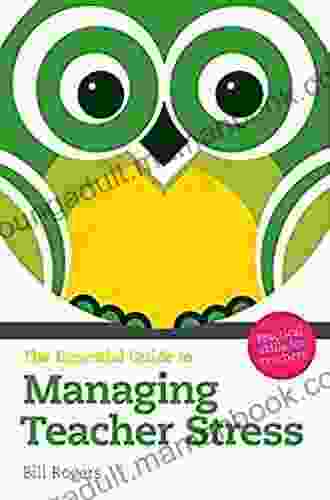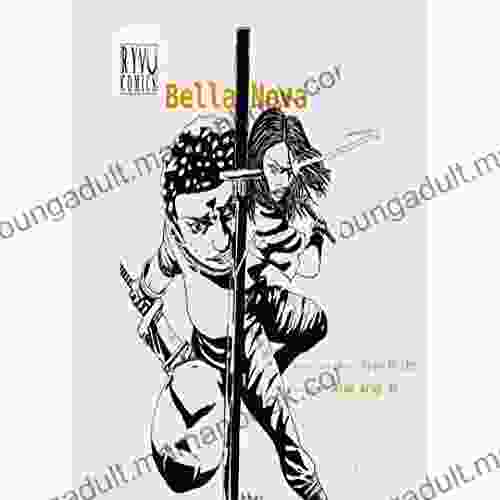Practical Skills for Teachers: The Essential Guide to Maximizing Student Learning

As a teacher, you play a crucial role in the lives of your students. You are responsible for their academic, social, and emotional development. To be an effective teacher, you need to have a solid foundation in practical skills. These skills will help you to create a positive learning environment, manage your classroom effectively, and teach your students in a way that is engaging and effective.
This guide will provide you with an overview of the essential practical skills for teachers. We will discuss classroom management, lesson planning, assessment, differentiation, technology integration, communication skills, interpersonal skills, problem-solving skills, and decision-making skills.
4 out of 5
| Language | : | English |
| File size | : | 5315 KB |
| Screen Reader | : | Supported |
| Print length | : | 236 pages |
| Paperback | : | 46 pages |
| Item Weight | : | 4.2 ounces |
| Dimensions | : | 6 x 0.12 x 9 inches |
Classroom Management
Classroom management is the ability to create and maintain a positive learning environment. This includes establishing clear rules and routines, managing student behavior, and creating a sense of community. Effective classroom management skills are essential for creating a productive learning environment where students can focus on their studies.
There are a number of different classroom management strategies that you can use. Some common strategies include:
- Positive reinforcement: Rewarding students for good behavior.
- Negative consequences: Giving students consequences for misbehavior.
- Assertive discipline: Setting clear expectations and enforcing them fairly.
- Collaborative discipline: Involving students in the development of rules and consequences.
- Behavior modification: Using techniques to change student behavior.
The best classroom management strategy for you will depend on your individual students and your teaching style. It is important to find a strategy that you are comfortable with and that is effective in your classroom.
Lesson Planning
Lesson planning is the process of creating a plan for your lessons. This includes identifying the learning objectives, choosing appropriate activities, and planning for assessment. Effective lesson planning skills are essential for ensuring that your lessons are effective and engaging.
There are a number of different steps involved in lesson planning. Some common steps include:
- Identifying the learning objectives: What do you want your students to learn?
- Choosing appropriate activities: What activities will help your students achieve the learning objectives?
- Planning for assessment: How will you assess your students' learning?
- Differentiation: How will you accommodate the needs of all learners?
- Technology integration: How will you use technology to enhance your lessons?
Lesson planning is an important part of teaching. It helps you to stay organized and ensures that your lessons are effective and engaging.
Assessment
Assessment is the process of gathering information about student learning. This information can be used to track student progress, identify areas of need, and make instructional decisions. Effective assessment skills are essential for ensuring that your students are learning and that you are meeting their individual needs.
There are a number of different assessment methods that you can use. Some common assessment methods include:
- Formative assessment: Ongoing assessment that is used to provide feedback to students and to inform instruction.
- Summative assessment: Assessment that is used to measure student achievement at the end of a unit or course.
- Portfolio assessment: A collection of student work that is used to demonstrate student progress over time.
- Performance assessment: Assessment that requires students to demonstrate their skills and knowledge through hands-on tasks.
The best assessment method for you will depend on your individual students and your teaching style. It is important to use a variety of assessment methods to get a complete picture of student learning.
Differentiation
Differentiation is the process of adapting instruction to meet the needs of all learners. This includes providing students with different levels of support, using different teaching strategies, and modifying assignments. Effective differentiation skills are essential for ensuring that all students have the opportunity to succeed.
There are a number of different ways to differentiate instruction. Some common differentiation strategies include:
- Content differentiation: Providing students with different content to learn, based on their readiness levels.
- Process differentiation: Providing students with different ways to learn the content, based on their learning styles.
- Product differentiation: Providing students with different ways to demonstrate their learning, based on their interests and strengths.
Differentiation is an important part of teaching. It helps you to ensure that all students have the opportunity to learn and succeed.
Technology Integration
Technology integration is the process of using technology to enhance teaching and learning. This includes using technology for instruction, assessment, and communication. Effective technology integration skills are essential for preparing students for the 21st century workforce.
There are a number of different ways to integrate technology into your teaching. Some common ways to integrate technology include:
- Using technology to present information: Using presentation software, videos, and online resources to present information to students.
- Using technology for student projects: Using technology to help students create projects, such as presentations, videos, and websites.
- Using technology for assessment: Using technology to assess student learning, such as online quizzes and surveys.
- Using technology for communication: Using technology to communicate with students and parents, such as email, text messaging, and social media.
Technology integration is an important part of teaching. It helps you to prepare students for the 21st century workforce and to make your lessons more engaging and effective.
Communication Skills
Communication skills are essential for effective teaching. You need to be able to communicate clearly and effectively with your students, parents, and colleagues. Strong communication skills will help you to build relationships, manage your classroom, and teach your students effectively.
There are a number of different communication skills that you can develop. Some common communication skills include:
- Verbal communication: Speaking clearly and effectively.
- Nonverbal communication: Body language, eye contact, and gestures.
- Listening: Paying attention to what others are saying and understanding their point of view.
- Writing: Communicating clearly and effectively in writing.
You can develop your communication skills through practice and training. Take opportunities to speak in front of groups, practice listening to others, and improve your writing skills.
Interpersonal Skills
Interpersonal skills are the ability to interact effectively with others. This includes building relationships, resolving conflict, and working collaboratively. Strong interpersonal skills will help you to create a positive classroom environment and to build relationships with your students, parents, and colleagues.
There are a number of different interpersonal skills that you can develop. Some common interpersonal skills include:
- Empathy: Understanding the feelings of others and being able to put yourself in their shoes.
- Active listening: Paying attention to what others are saying and understanding their point of view.
- Conflict resolution: Resolving conflict in a positive and constructive way.
- Teamwork: Working effectively with others to achieve a common goal.
You can develop your interpersonal skills through practice and training. Take opportunities to interact with others, practice active listening, and resolve conflict in a positive way.
Problem-Solving Skills
Problem-solving skills are the ability to identify and solve problems. This includes critical thinking, decision-making, and creative thinking. Strong problem-solving skills
4 out of 5
| Language | : | English |
| File size | : | 5315 KB |
| Screen Reader | : | Supported |
| Print length | : | 236 pages |
| Paperback | : | 46 pages |
| Item Weight | : | 4.2 ounces |
| Dimensions | : | 6 x 0.12 x 9 inches |
Do you want to contribute by writing guest posts on this blog?
Please contact us and send us a resume of previous articles that you have written.
 Top Book
Top Book Novel
Novel Fiction
Fiction Nonfiction
Nonfiction Literature
Literature Paperback
Paperback Hardcover
Hardcover E-book
E-book Audiobook
Audiobook Bestseller
Bestseller Classic
Classic Mystery
Mystery Thriller
Thriller Romance
Romance Fantasy
Fantasy Science Fiction
Science Fiction Biography
Biography Memoir
Memoir Autobiography
Autobiography Poetry
Poetry Drama
Drama Historical Fiction
Historical Fiction Self-help
Self-help Young Adult
Young Adult Childrens Books
Childrens Books Graphic Novel
Graphic Novel Anthology
Anthology Series
Series Encyclopedia
Encyclopedia Reference
Reference Guidebook
Guidebook Textbook
Textbook Workbook
Workbook Journal
Journal Diary
Diary Manuscript
Manuscript Folio
Folio Pulp Fiction
Pulp Fiction Short Stories
Short Stories Fairy Tales
Fairy Tales Fables
Fables Mythology
Mythology Philosophy
Philosophy Religion
Religion Spirituality
Spirituality Essays
Essays Critique
Critique Commentary
Commentary Glossary
Glossary Bibliography
Bibliography Index
Index Table of Contents
Table of Contents Preface
Preface Introduction
Introduction Foreword
Foreword Afterword
Afterword Appendices
Appendices Annotations
Annotations Footnotes
Footnotes Epilogue
Epilogue Prologue
Prologue Novus Fishing
Novus Fishing Stuart Doughty
Stuart Doughty Ann Hood
Ann Hood Nancy Revell
Nancy Revell Alyson Reid Larade
Alyson Reid Larade Ray Hitchins
Ray Hitchins S A Klopfenstein
S A Klopfenstein Nichole Mcelhaney
Nichole Mcelhaney Allen Pud Deters
Allen Pud Deters Jeanne Marie Laskas
Jeanne Marie Laskas Robert Grey Reynolds Jr
Robert Grey Reynolds Jr Michael Bernick
Michael Bernick Tite Kubo
Tite Kubo Ian Goldin
Ian Goldin Joe Buff
Joe Buff Mario Giordano
Mario Giordano Jillian Lin
Jillian Lin Hrishikesh Goswami
Hrishikesh Goswami Joel Goldman
Joel Goldman Allison Lawrence
Allison Lawrence
Light bulbAdvertise smarter! Our strategic ad space ensures maximum exposure. Reserve your spot today!

 Nick TurnerPaint It Blackmail: The Sinister Saga of John Kite and the Threat He Posed to...
Nick TurnerPaint It Blackmail: The Sinister Saga of John Kite and the Threat He Posed to... Jackson BlairFollow ·17.6k
Jackson BlairFollow ·17.6k Darius CoxFollow ·19.5k
Darius CoxFollow ·19.5k Colin RichardsonFollow ·13.3k
Colin RichardsonFollow ·13.3k Russell MitchellFollow ·13.4k
Russell MitchellFollow ·13.4k Brandon CoxFollow ·2.9k
Brandon CoxFollow ·2.9k Ryūnosuke AkutagawaFollow ·11.4k
Ryūnosuke AkutagawaFollow ·11.4k Eli BrooksFollow ·12k
Eli BrooksFollow ·12k Oscar BellFollow ·15.9k
Oscar BellFollow ·15.9k

 Yukio Mishima
Yukio MishimaUnveiling the Zimmermann Telegram: A Pivotal Document in...
The Zimmermann Telegram, a diplomatic...

 George Martin
George MartinFearful Stories and Vile Pictures to Instruct Good Little...
In the annals of children's literature, few...

 Grant Hayes
Grant HayesJessica the Viscount Wallflower: A Tale of Transformation...
In the opulent ballrooms and glittering...

 Jerome Blair
Jerome BlairThe Economics of the Global Defence Industry: A...
The global...

 Blake Kennedy
Blake KennedyBreath of Heron - A Window into the Poetic Depths of...
In the realm of...
4 out of 5
| Language | : | English |
| File size | : | 5315 KB |
| Screen Reader | : | Supported |
| Print length | : | 236 pages |
| Paperback | : | 46 pages |
| Item Weight | : | 4.2 ounces |
| Dimensions | : | 6 x 0.12 x 9 inches |












